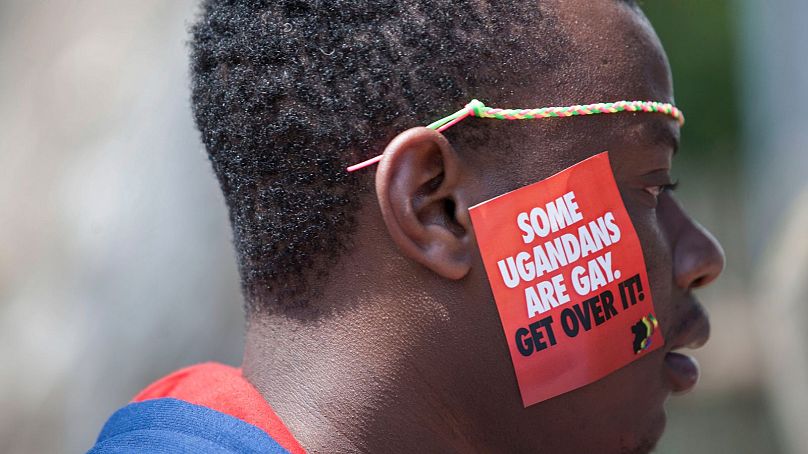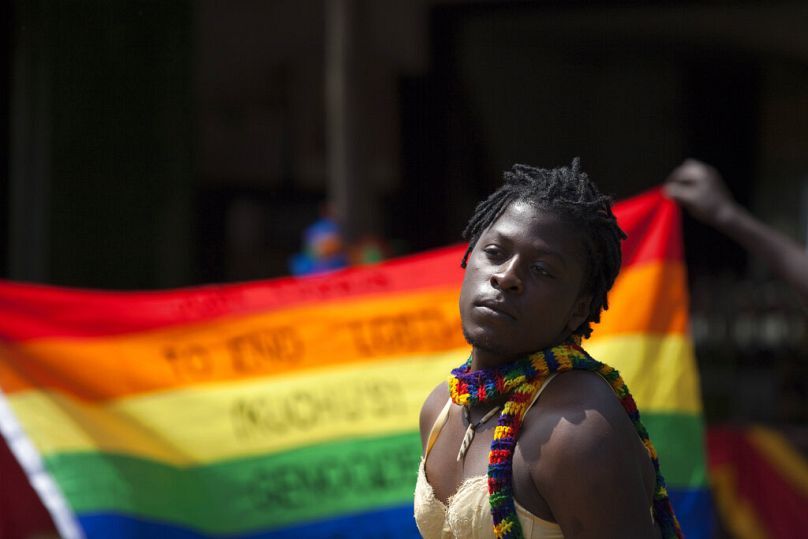The Uganda government recently introduced a new bill making it a crime to identify as LGBTQ+.
Uganda's LGBT community are living "in total fear" after a new bill was passed last month making it illegal to identify as lesbian, gay, bisexual or transgender.
 ADVERTISEMENT
ADVERTISEMENT
 ADVERTISEMENT
ADVERTISEMENT
Penalties include life in prison or even a death sentence in come cases.
Now activists are calling on the European Union to stop sending aid to the African nation, and use it instead as leverage for greater human rights protections.
Edward Mutebi, a Ugandan citizen residing in Germany, told Euronews that the bill was passed in the Ugandan parliament "in a spirit of hypocrisy [...] with hatred, anger and misinformation," and that persecution of the LGBT community was already increasing ahead of the vote.
Ugandan religious leaders have ratcheted up the rhetoric, calling for for LGBT individuals to be killed, Mutebi said, "and the effect on the community has been really, really bad."
“Imagine we’ve been suffering from persecution before, but now it’s on another level," he told Euronews.
"They’re calling for our extinction, they want to round up everyone who identifies as gay and put them in prison for life. Some people are even calling for the castration of homosexuals,” he continued. “We’re worried about what’s coming next.”
Cries for help from the community
The NGO which Mutebi founded, 'Let's Walk Uganda', has been flooded with calls for help from the LGBT community for months, with people seeking advice on how to leave the country and go to Kenya -- although issues related to LGBT rights have also been at the centre of a recent debate in the neighbouring country.
"There’s one phone call I received which drew me to tears,” Mutebi said.
“A boy of 17 who told his family he was gay and was thrown out of his home. He’s now living in the street. But you can’t even engage as an organisation, this is a minor, and you’d be arrested.”
Mutebi fears that an already terrible situation might soon get even worse. “ We’ve received stories of people being attacked, undressed, beaten up, and even castrated,” he said. “And that was before the bill was even passed. [...] We can’t see this happening in the modern era, that people can be put in prison for life just because they love each other.”
Calls to withdraw EU aid
One tactict that Mutebi thinks would make Uganda's government reconsider the laws is if the EU withdrew aid.
Stopping funds would "definitely be very helpful" in challenging the anti-gay policies, he said.
Uganda, traditionally one of the largest recipients of international aid, has already seen its generous aid budget being significantly cut in 2014 after President Yoweri Museveni -- who was once seen as an example of enlightened African leadership -- signed a law which made homosexuality a crime punishable with life imprisonment in the East African country.
Initially, the bill -- known as the ‘kill-the-gays’ bill -- wanted homosexuality to be considered a crime punishable by death. It was later amended after receiving widespread condemnation.
Back in 2014, the EU decided against cutting aid to Uganda or imposing sanctions on the country in response to the violations of LGBTQ+ rights in Uganda, preferring to exert social public pressure on the country through political dialogue rather than material pressure.
The lack of material pressure was contested by some members of the European Parliament, but others feared that cutting funding to the Ugandan government might make the situation for LGBT people in the country even more difficult; while still other MEPs were concerned that any sanctions imposed on the East African country might appear like a neo-colonial practice.
But the Ugandan government’s attacks on LGBT people have only gotten worse in the last ten years.
Homosexuality is currently banned in more than 30 African countries, including Uganda, but the bill approved by the country’s parliament -- and which is now awaiting Museveni’s signature to become effective -- is the first to make it a crime to simply identify as a member of the LGBT community.
Meanwhile, Uganda -- one of the EU’s most important development partners in the region -- is still cashing in millions in aid from the EU. In 2022, the East African country received over €40 million in humanitarian funding alone for the more than 1.4 million refugees staying in Uganda. The EU's Multiannual Indicative Programme (MIP) for Uganda for 2021-2024 -- which includes funds that should help the country transition towards a greener and more sustainable economy and strengthen democracy and human rights -- amounts to €375 million.
“Uganda is one country which survives on donor funding, and our economy and budget are fueled by Western funds and support, from the health sector to the military,” explained Edward Mutebi.
The pressure of the EU withdrawing funds from Uganda would “definitely work” in forcing the Ugandan government to withdraw its anti-LGBT legislation “because the government cannot operate without funding.”
In 2014, three European countries – Norway, Denmark, and the Netherlands – decided to cut aid to Uganda in response to the Ugandan government’s anti-LGBT law, which they strongly condemned. Norway said it would have withheld $8 million (€7.3 million) in development aid, while Denmark said it would have diverted $9 million (€8.2 million) from the government. The Netherlands declared it would have suspended aid to the government but continued funding non-profit groups in the country.
“If any country really stands up and says we’re not going to give you funding because of this and that, the government will definitely listen,” Mutebi added. “I want to invite all countries, European countries and all Western countries to stand up against this bill which is in violation of human rights. Every country in Europe which believes in human rights [...] should withdraw funding until the government of Uganda drops this bill.”
Commenting on the possibility of the EU cutting development funds to Uganda, an EU spokesperson told Euronews: “It is too early to say. We will follow the developments regarding the promulgation of the law carefully and assess the situation as it develops.”
In a statement, the EU said it was "deeply concerned by the passing of an anti-homosexuality bill by the Ugandan Parliament, which introduces severe punishments, including the death penalty. The EU is opposed to the death penalty in all circumstances.
“According to the African Charter on Human and People’s Rights, 'every individual shall have the duty to respect and consider his fellow beings without discrimination, and to maintain relations aimed at promoting, safeguarding and reinforcing mutual respect and tolerance'".
Who is driving Uganda’s anti-LGBTQ+ push?
The anti-LGBTQ+ push in the East African country is coming from both Ugandan political leaders and religious leaders.
On the religious side, this wave of hate is being fueled by the American culture wars and the West, Mutebi said.
"Anti-LGBT pastors are being funded by anti-gender movements from the West and America, they’re giving them funds to spread hatred in the country,” he said.
On the political side, Mutebi thinks that the persecution and discrimination of the LGBT community is a “diversion” from Uganda’s economic problems and the government’s failures.
“We’re scapegoats. How can we divert people’s minds from our problems? The diversion they’ve always pushed forward is that of homosexuality.”
Uganda’s first anti-gay bill was introduced by the country’s parliament in 2009 and came into force in 2014.
“Ten years down the road, they’re coming back with the same thing, the same threat,” Mutebi said.
“Every time the country is approaching an election they’ll bring out the topic of homosexuality to divert people’s attention from discussing very serious issues like inflation and the cost of living.”












